Diego Maradona
Diego Maradona
Renowned for his role as an advanced playmaker in the classic number 10 position, Maradona showcased a unique combination of exceptional vision, precise passing, exquisite ball control, and remarkable dribbling skills. His compact stature provided a low center of gravity, enabling him to navigate the pitch with unparalleled agility. Maradona's influence extended beyond his technical prowess; his on-field presence and leadership significantly impacted his team's overall performance, often making him the focal point for opposing teams. Apart from his playmaking abilities, he demonstrated a keen eye for goal and earned a reputation as a free-kick specialist. Recognized as a prodigious talent, Maradona was affectionately nicknamed "El Pibe de Oro" ("The Golden Boy"), a moniker that resonated throughout his illustrious career.
Maradona holds the distinction of being the first player to establish the world record transfer fee on two occasions. In 1982, he made a historic move to Barcelona for £5 million, and then in 1984, he set a new record by joining Napoli for a fee of £6.9 million. Over the course of his club career, Maradona played for Argentinos Juniors, Boca Juniors, Barcelona, Napoli, Sevilla, and Newell's Old Boys. However, it was his tenure at Napoli that brought him widespread acclaim, earning numerous accolades and leading the club to Serie A title victories on two occasions. Despite his on-field success, Maradona faced challenges in his personal life, and his association with Napoli came to an end following a ban for cocaine use.
One of the most iconic moments occurred in the 1986 World Cup quarter-final, where Maradona single-handedly shaped football history. He scored both goals in a 2–1 win over England, with the first goal being a controversial, unpenalized handling foul famously referred to as the "Hand of God." The second goal showcased Maradona's extraordinary skill, involving a remarkable 60-meter (66-yard) dribble past five England players—a moment immortalized as the "Goal of the Century" by FIFA.com voters in 2002. 
In November 2008, Maradona took on the role of the coach for Argentina's national football team. He guided the team through the 2010 World Cup in South Africa before parting ways at the end of the tournament. Subsequently, he assumed coaching responsibilities for Dubai-based club Al Wasl in the UAE Pro-League during the 2011–12 season. In 2017, Maradona continued his coaching journey by leading Fujairah but departed at the conclusion of the season.
Announced as the new chairman of Belarusian club Dynamo Brest in May 2018, Maradona arrived in Brest and was formally presented by the club to commence his duties in July. Between September 2018 and June 2019, he served as the coach of the Mexican club Dorados. Later, he took on the coaching role at the Argentine Primera División club Gimnasia de La Plata in September 2019, holding the position until his passing in 2020. It is noteworthy that FourFourTwo magazine honored him by ranking him as the third-best football player of all time.
Diego Armando Maradona was born on 30 October 1960, at the Policlínico Evita Hospital in Lanús, Buenos Aires Province. He was born into a humble family that had relocated from Corrientes Province. His childhood unfolded in Villa Fiorito, a shantytown on the southern outskirts of Buenos Aires, Argentina. Maradona, the first son after four daughters, had two younger brothers, Hugo (el Turco) and Raúl (Lalo), both of whom also pursued professional football careers.
His father, Diego Maradona "Chitoro" (1927–2015), worked at a chemicals factory and was of Guaraní (Indigenous) and Galician (Spanish) descent. His mother, Dalma Salvadora Franco, "Doña Tota" (1930–2011), had Italian and Croatian ancestry. This diverse cultural background shaped the roots of one of the greatest football legends in history.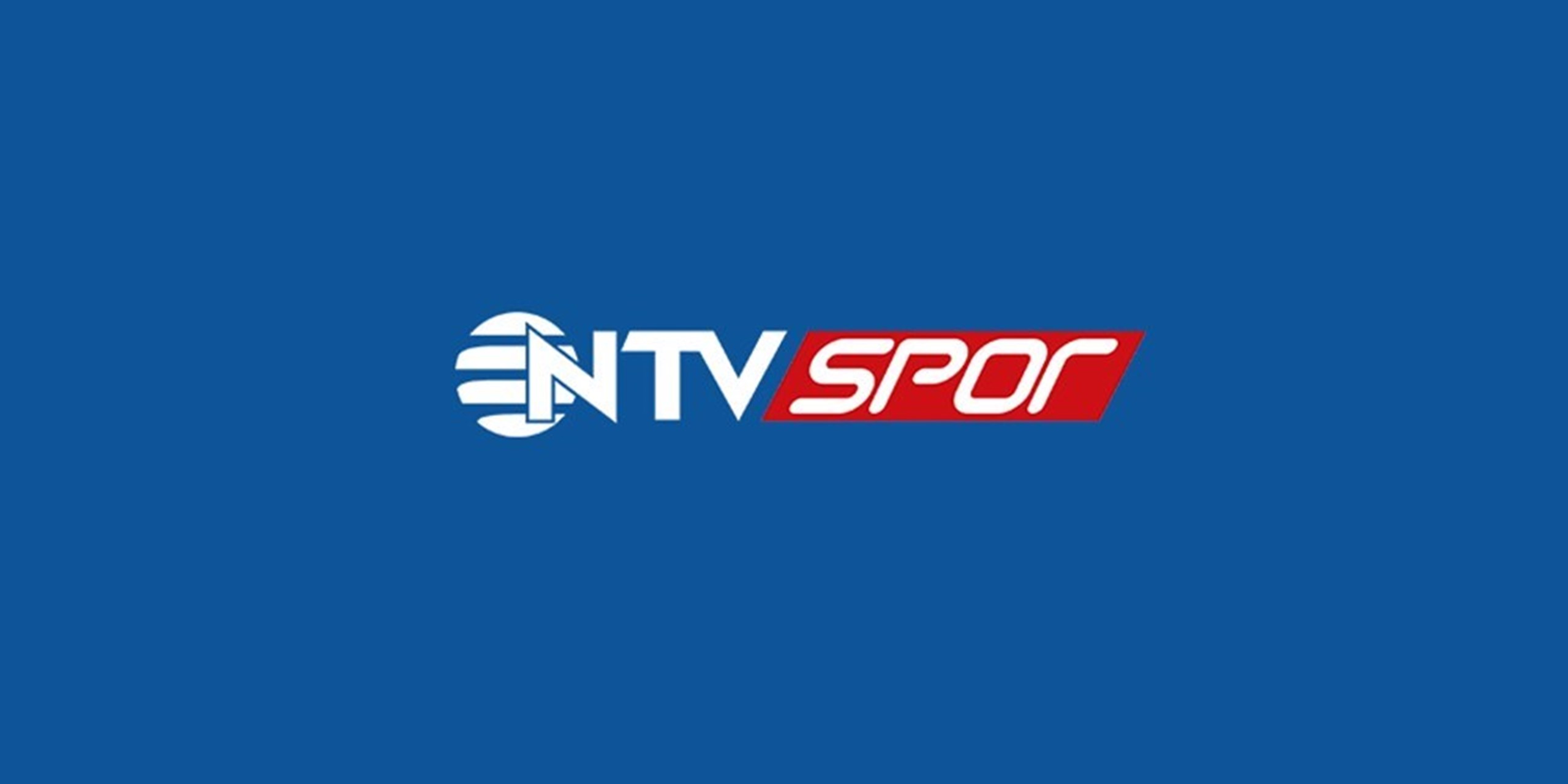
"When Diego arrived at Argentinos Juniors for trials, I was truly amazed by his talent, and it was hard to believe he was only eight years old. In fact, we were so taken aback that we asked him for his ID card to verify his age, but he informed us that he didn't have it with him. Given his physical appearance, resembling that of a child, we initially thought he was teasing us. However, as we later confirmed the truth, we made the collective decision to wholeheartedly dedicate ourselves to nurturing his extraordinary talent."
Maradona's parents were natives of Esquina, a town in the northeast province of Corrientes situated along the banks of the Corriente River. They both grew up in Esquina but chose to move to Buenos Aires in the 1950s.Maradona's introduction to football began at the age of three when he received his first football as a gift, sparking an immediate passion for the sport. His journey to football stardom commenced at the age of eight when a talent scout discovered him playing for his local club, Estrella Roja. In March 1969, a recommendation from his close friend and football rival, Gregorio Carrizo, led Maradona to join Los Cebollitas (The Little Onions), the junior team of Argentinos Juniors in Buenos Aires, under the coaching of Francis Gregorio Cornejo.
Maradona quickly ascended to stardom with Los Cebollitas, and even as a 12-year-old ball boy, he entertained spectators with his exceptional ball skills during halftime breaks of Argentinos Juniors' first division games.In the years 1973 and 1974, Maradona, alongside players like Adrian Domenech and Claudio Rodríguez, guided Cebollitas to two Evita Tournament victories and an impressive streak of 141 undefeated games. This period is often recognized as the pinnacle of youth team success in the history of Argentine football.Maradona looked up to Brazilian playmaker Rivellino and Manchester United winger George Best as his inspirations during his formative years.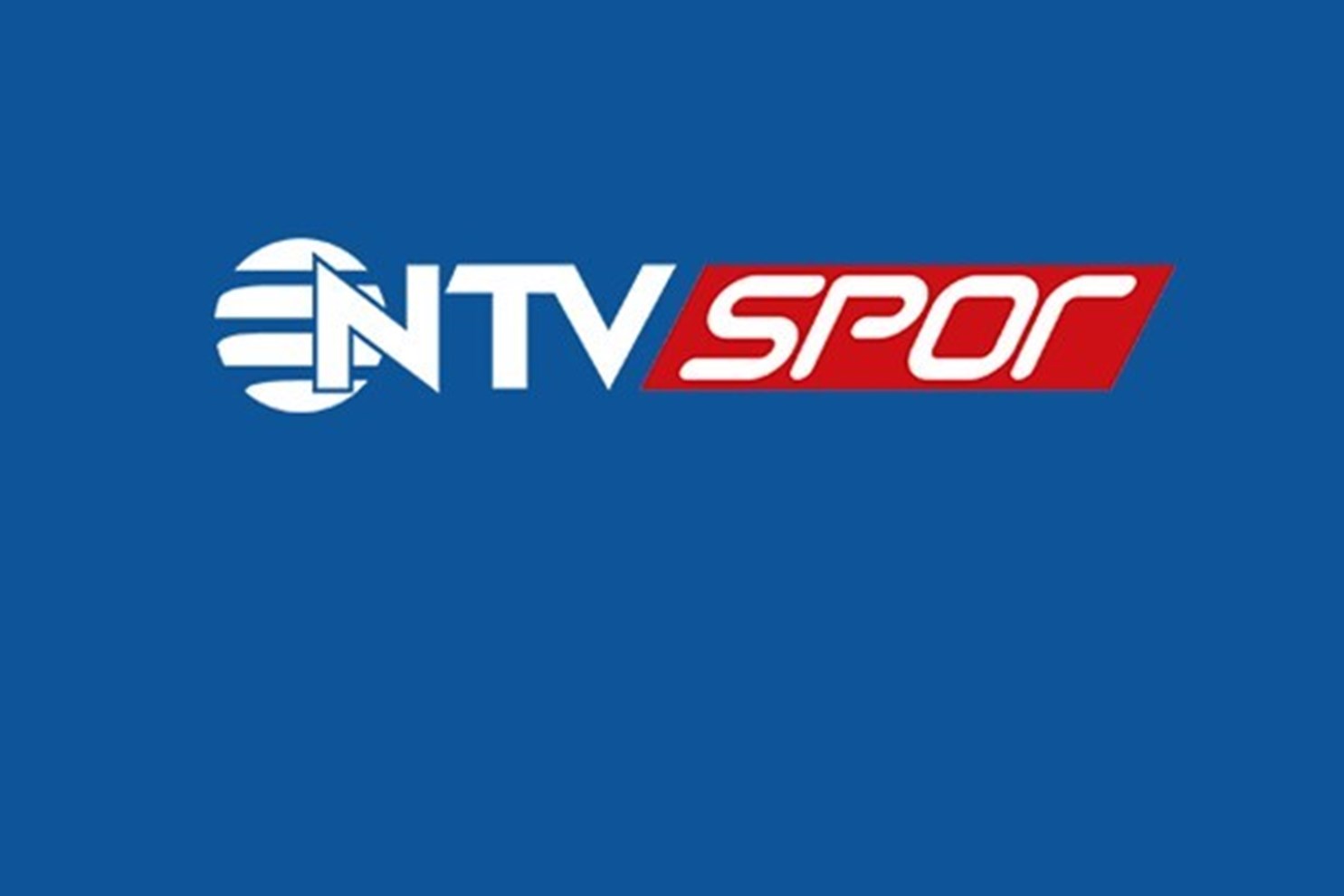
On 20 October 1976, just 10 days before his 16th birthday, Maradona marked his professional debut for Argentinos Juniors against Talleres de Córdoba. Donning the number 16 jersey, he entered the pitch and etched his name in history as the youngest player ever to grace the Argentine Primera División. A few minutes into his debut, Maradona showcased his exceptional talent with a nutmeg, threading the ball through the legs of Juan Domingo Cabrera—a move that would become emblematic of his skills. Reflecting on that momentous day, Maradona remarked, "That day I felt I had held the sky in my hands. Three decades later, Cabrera, the player on the receiving end of Maradona's nutmeg, recalled the debut, saying, "I was on the right side of the field and went to press him, but he didn't give me a chance. He made the nutmeg and when I turned around, he was far away from me."
Maradona notched his inaugural goal in the Primera División against San Lorenzo, a Marplatense team, on 14 November 1976, merely two weeks after celebrating his 16th birthday.
Maradona's tenure at Argentinos Juniors spanned five years, from 1976 to 1981, during which he made 167 appearances and scored an impressive 115 goals. His remarkable performance attracted attention, leading to a significant US$4 million transfer to Boca Juniors in 1981. Despite receiving offers from other clubs, including River Plate, which proposed to make him the club's highest-paid player, Maradona ultimately chose Boca Juniors. River Plate withdrew its bid, citing financial constraints in retaining players like Daniel Passarella and Ubaldo Fillol.
Maradona officially joined Boca Juniors on 20 February 1981, making his debut two days later against Talleres de Córdoba, where he scored twice in a 4–1 victory. On 10 April, he participated in his first Superclásico against River Plate at La Bombonera stadium. Boca emerged victorious with a 3–0 scoreline, and Maradona contributed a goal after skillfully dribbling past Alberto Tarantini and Fillol. Despite a somewhat strained relationship with Boca Juniors manager Silvio Marzolini,the club had a successful season, clinching the league title by securing a crucial point against Racing Club.This championship would be the sole domestic league title won by Maradona during his time in Argentina.
Following the 1982 World Cup, in June, Maradona made a historic transfer to Barcelona in Spain, commanding a then-world record fee of £5 million ($7.6 million). Under the guidance of coach César Luis Menotti, Barcelona and Maradona achieved significant success in 1983. They clinched the Copa del Rey, Spain's annual national cup competition, by defeating Real Madrid, and secured the Spanish Super Cup with a victory over Athletic Bilbao.
On 26 June 1983, Barcelona triumphed in a highly anticipated match against Real Madrid, famously known as El Clásico. Maradona's impact was indelible as he scored, becoming the first Barcelona player ever to be applauded by rival Real Madrid fans. In a memorable moment, Maradona dribbled past Real Madrid's goalkeeper Agustín. As he approached the empty goal, he strategically halted just as Madrid defender Juan José slid in an attempt to block the shot. José collided with the post, allowing Maradona to calmly slot the ball into the net. The unique manner in which the goal unfolded led to applause from opposition fans. To date, only Ronaldinho (in November 2005) and Andrés Iniesta (in November 2015) have received such acknowledgment as Barcelona players from Real Madrid fans at the Santiago Bernabéu.
Maradona faced considerable challenges during his time at Barcelona, marked by illness, injuries, and controversial incidents on the field. His tenure in Barcelona was marred by a series of setbacks, beginning with a bout of hepatitis. Subsequently, in a La Liga game at the Camp Nou in September 1983, Maradona suffered a broken ankle due to a reckless tackle by Athletic Bilbao's Andoni Goikoetxea, commonly referred to as "the Butcher of Bilbao." This incident posed a significant threat to Maradona's career. However, through diligent treatment and rehabilitation, he managed to make a triumphant return to the pitch after a three-month recovery period.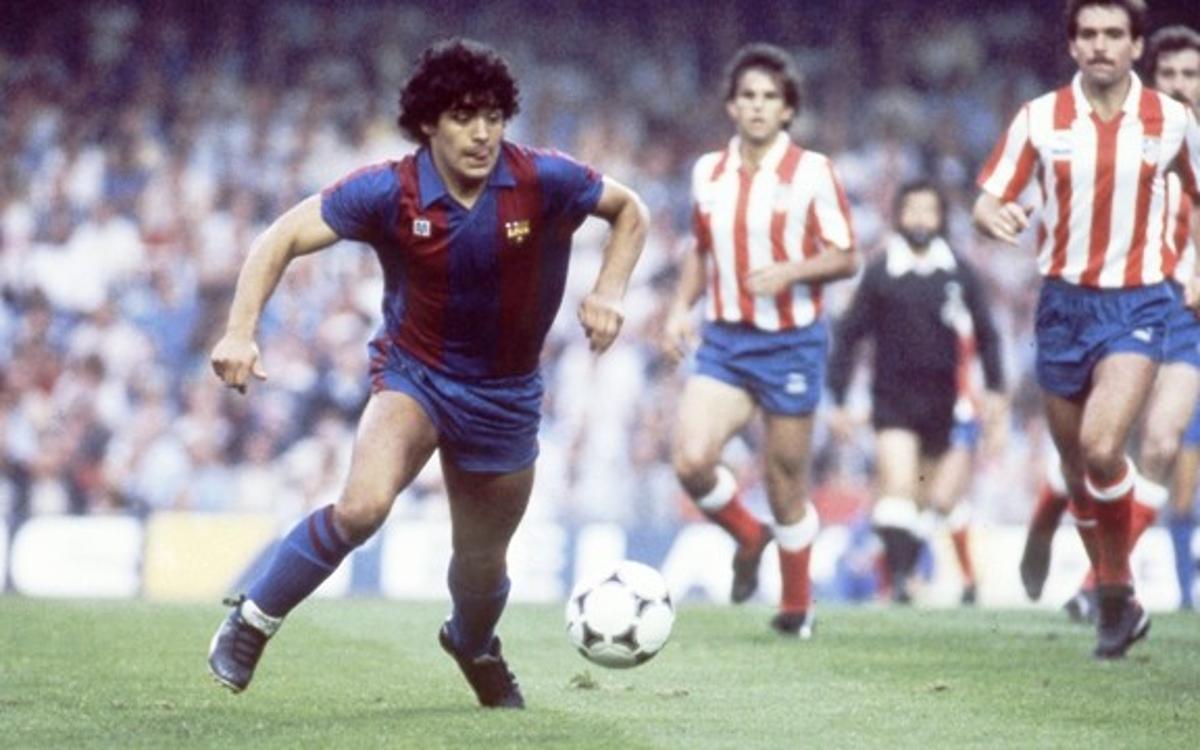
Maradona found himself in the midst of a violent and chaotic altercation during the 1984 Copa del Rey Final at the Santiago Bernabéu stadium in Madrid, where Barcelona faced Athletic Bilbao. Following another forceful tackle by Goikoetxea, coupled with racist insults directed at Maradona regarding his father's Native American ancestry from Bilbao fans throughout the match, tensions escalated. The situation reached a boiling point after Bilbao's Miguel Sola taunted Maradona at full time, following Barcelona's 1–0 loss.
In response to the provocation, Maradona erupted. Standing mere inches from Sola's face, the two exchanged heated words, triggering a chain reaction of emotional outbursts from both teams. Sola, using expletives, mimicked a gesture from the crowd with a xenophobic term aimed at Maradona.Enraged, Maradona headbutted Sola, elbowed another Bilbao player in the face, and kneed yet another player in the head, rendering him unconscious. The Bilbao squad, seeking retribution, surrounded Maradona, with Goikoetxea delivering a high kick to his chest. The rest of the Barcelona squad swiftly intervened to assist Maradona, leading to a brawl between Barcelona and Bilbao players on the field, with Maradona at the center of the melee, kicking and punching any Bilbao player in his vicinity.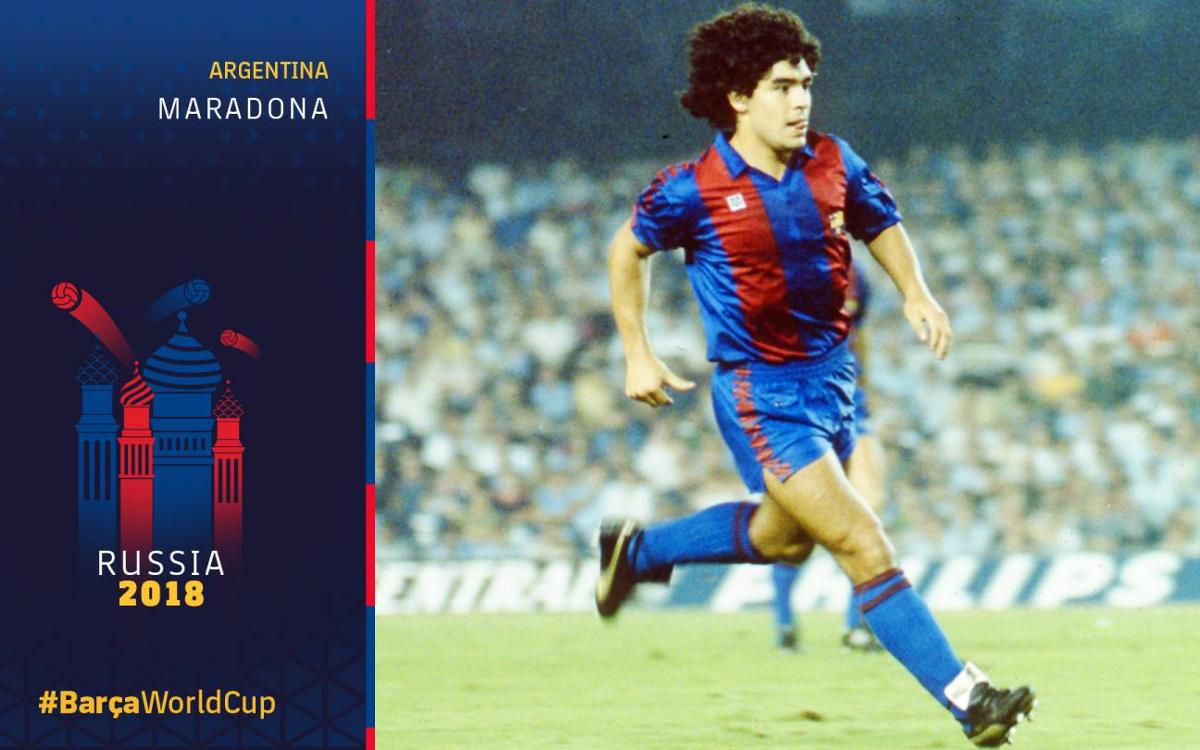
The intense brawl unfolded before Spanish King Juan Carlos and an audience of 100,000 fans inside the Santiago Bernabéu stadium, with over half of Spain watching the chaos on television. As fans began hurling solid objects onto the field, targeting players, coaches, and even photographers, the situation escalated, resulting in sixty people sustaining injuries. This incident proved to be the tipping point for Maradona's departure from Barcelona, serving as his final appearance in a Barcelona shirt. Reflecting on the chaotic scenes, one Barcelona executive remarked, "When I saw those scenes of Maradona fighting and the chaos that followed, I realized we couldn't go any further with him."
Maradona had frequent disputes with FC Barcelona executives, particularly club president Josep Lluís Núñez. These disagreements culminated in a demand from Maradona to be transferred out of Camp Nou in 1984. Despite facing injury challenges during his two seasons at Barcelona, Maradona managed to score 38 goals in 58 games. His next move saw him transfer to Napoli in Italy's Serie A, with the transfer commanding another world record fee, this time amounting to £6.9 million ($10.48 million).
Maradona made his entry into Naples and was officially introduced as a Napoli player on 5 July 1984. The grand presentation took place at the Stadio San Paolo, where a staggering 75,000 fans gathered to welcome him. Sports writer David Goldblatt remarked, "They [the fans] were convinced that the savior had arrived." Reflecting the sentiment of the city, a local newspaper boldly proclaimed that despite the challenges faced by Naples, including the absence of a "mayor, houses, schools, buses, employment, and sanitation," none of it mattered because they now had Maradona.
Before Maradona's arrival, Italian football was largely dominated by teams from the north and central regions of the country, such as A.C. Milan, Juventus, Inter Milan, and Roma. Notably, no team in the southern part of the Italian Peninsula had ever secured a league title. This created an opportune setting for Maradona, aligning with his working-class-sympathetic image. He joined Napoli, a once-great team that was on the verge of relegation at the conclusion of the 1983–84 Serie A season, competing in what was considered the toughest and most esteemed football league in Europe.
During his time at Napoli, Maradona reached the pinnacle of his professional career, swiftly inheriting the captain's armband from Napoli veteran defender Giuseppe Bruscolotti. In no time, he became an adored star among the club's fans, leading Napoli to the most successful era in its history. Maradona played for Napoli during a period when north–south tensions in Italy were particularly pronounced due to various issues, most notably economic disparities between the regions.
Under Maradona's leadership, Napoli achieved a historic milestone by winning their first-ever Serie A Italian Championship in the 1986–87 season. The celebrations were nothing short of tumultuous, with impromptu street parties and festivities breaking out across the city, evolving into a round-the-clock carnival that lasted over a week. The Neapolitans expressed their jubilation by holding mock funerals for traditional football powerhouses Juventus and Milan, symbolically burning their coffins. The accompanying death notices proclaimed, "May 1987, the other Italy has been defeated. A new empire is born. Murals of Maradona adorned the city's ancient buildings, and newborn children were named in his honor.
In the following season, Napoli's formidable attacking trio, consisting of Maradona, Bruno Giordano, and Careca, earned the moniker "Ma-Gi-Ca" (magical) for their exceptional performances in the front line.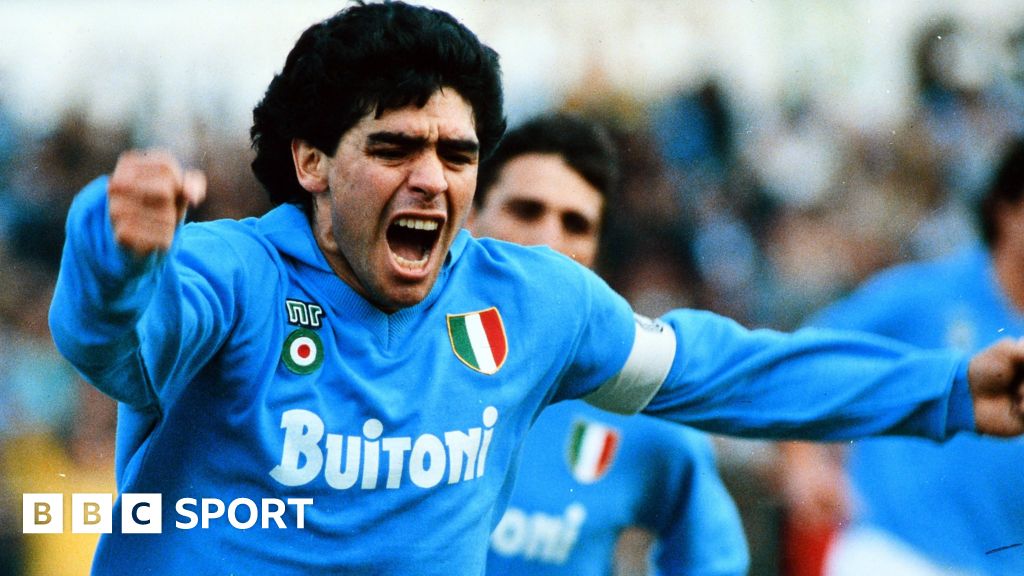
Napoli secured their second league title in 1989–90 under Maradona's leadership, with two additional runner-up finishes in the league during the 1987–88 and 1988–89 seasons.The period of Maradona's tenure at Napoli also brought several other honors, including the Coppa Italia triumph in 1987 (alongside a second-place finish in the Coppa Italia in 1989), the UEFA Cup in 1989, and the Italian Supercup in 1990.
In the 1989 UEFA Cup Final against Stuttgart, Maradona played a pivotal role, scoring from a penalty in a 2–1 home victory in the first leg and later assisting Careca's match-winning goal. In the second leg on 17 May, a 3–3 away draw, he contributed with an assist for Ciro Ferrara's goal through a header.Despite predominantly playing in a creative role as an attacking midfielder, Maradona emerged as the top scorer in Serie A during the 1987–88 season with 15 goals. Moreover, he held the distinction of being Napoli's all-time leading goalscorer with 115 goals, a record later surpassed by Marek Hamšík in 2017.When asked about the toughest player he ever faced, A.C. Milan central defender Franco Baresi singled out Maradona, a sentiment echoed by his Milan teammate Paolo Maldini.
Despite Maradona's success on the field during his tenure in Italy, his personal struggles escalated. His continued cocaine use led to fines totaling US$70,000 from his club, attributed to missed games and practices ostensibly due to "stress". Maradona also faced a scandal involving an illegitimate son and was subject to suspicion regarding an alleged association with the Camorra crime syndicate.
Furthermore, Maradona encountered intense backlash and harassment from some local fans after the 1990 World Cup, during which he and Argentina defeated Italy in a semi-final match at the San Paolo stadium. The aftermath of this event added to his challenges both on and off the field. In 2000, as a tribute to Maradona's legacy, Napoli officially retired the number 10 jersey he wore.
Nine days after Maradona's passing on December 4, 2020, Napoli honored the football legend by renaming their home stadium to Stadio Diego Armando Maradona.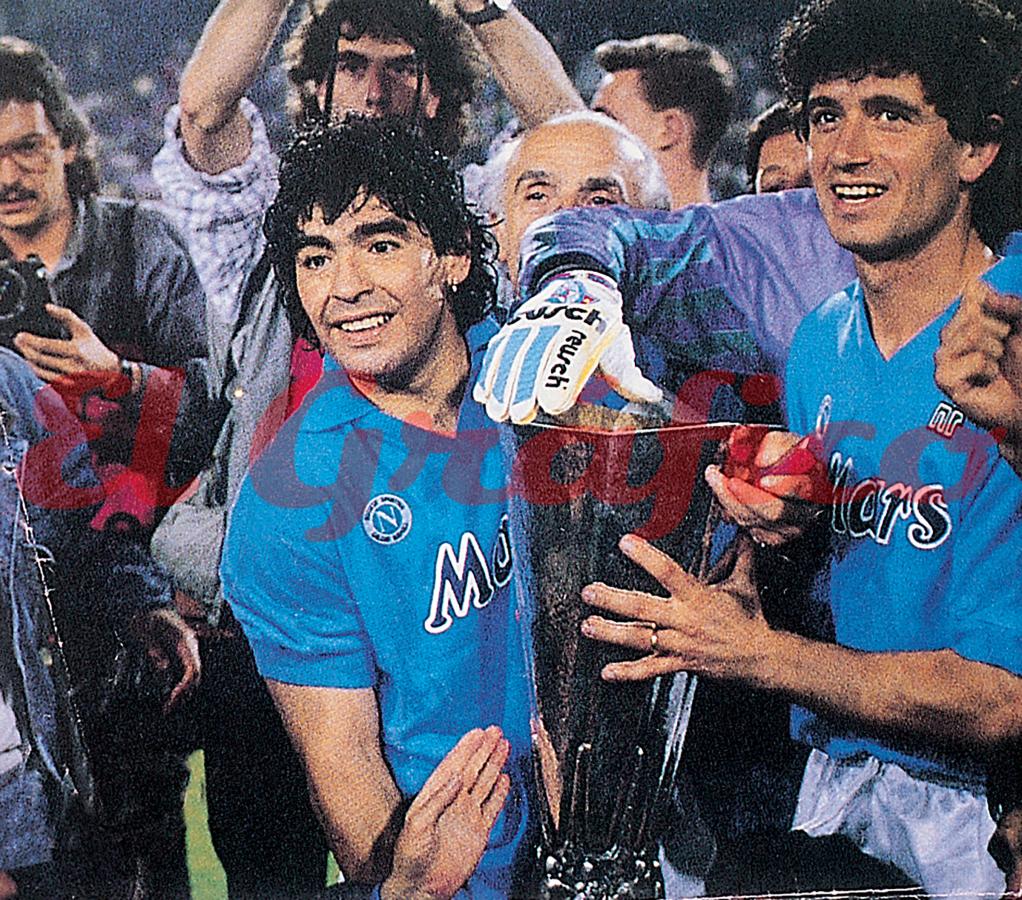
After serving a 15-month ban for failing a drug test related to cocaine, Maradona departed Napoli in disgrace in 1992. Despite receiving interest from Real Madrid and Marseille, he ultimately chose to sign with Sevilla, where he spent a single year. In 1993, Maradona joined Newell's Old Boys, and in 1995, he returned to Boca Juniors for a two-year stint. Notably, Maradona made a brief appearance for Tottenham Hotspur in a testimonial match for Osvaldo Ardiles against Internazionale, shortly before the 1986 World Cup. In 1996, he played in a friendly match alongside his brother Raul for Toronto Italia against the Canadian National Soccer League All-Stars.
In 2000, Maradona captained Bayern Munich in a friendly against the German national team during the farewell game of Lothar Matthäus. He was also the focus of a testimonial match in November 2001, pitting an all-star World XI against the Argentina national team.
Throughout his tenure with the Argentina national team, Maradona netted 34 goals in 91 appearances. His full international debut took place at the age of 16 against Hungary on 27 February 1977. Despite his talent, Maradona was omitted from the Argentine squad for the 1978 World Cup, which was hosted in Argentina, by coach César Luis Menotti, who deemed him too young at the age of 17.
At the age of 18, Maradona participated in the 1979 FIFA World Youth Championship in Japan and emerged as the standout player of the tournament. He played a pivotal role in Argentina's 3–1 final victory over the Soviet Union, scoring a total of six goals in six appearances during the competition. On 2 June 1979, Maradona scored his inaugural senior international goal in a 3–1 triumph against Scotland at Hampden Park.
Continuing his international career, Maradona represented Argentina in two 1979 Copa América matches in August 1979, experiencing a 2–1 defeat against Brazil and contributing to a 3–0 victory over Bolivia by scoring his team's third goal.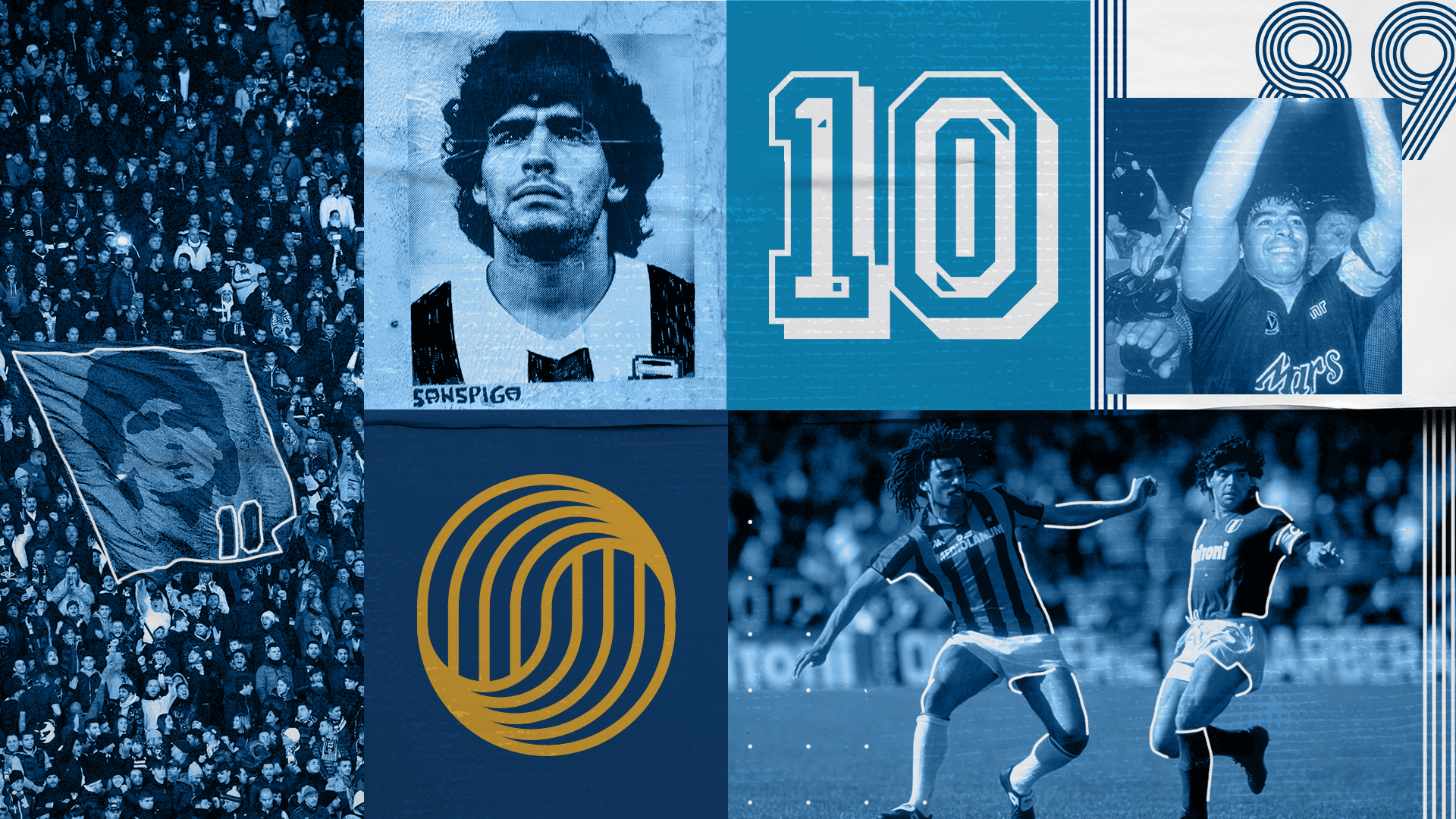
Maradona made his debut in the World Cup tournament in 1982, representing his new country of residence, Spain. Argentina faced Belgium in the opening game of the 1982 Cup at the Camp Nou in Barcelona. Unfortunately, Maradona did not meet expectations, and Argentina, the defending champions, suffered a 1–0 defeat. Despite convincing victories against Hungary and El Salvador in Alicante, securing advancement to the second round, internal tensions brewed within the team. Younger, less experienced players found themselves at odds with their older, more seasoned counterparts.The Argentine squad, featuring notable players like Mario Kempes, Osvaldo Ardiles, Ramón Díaz, Daniel Bertoni, Alberto Tarantini, Ubaldo Fillol, and Daniel Passarella, faced challenges in the second round. They were defeated by Brazil and, ultimately, by the eventual winners, Italy. The match against Italy gained notoriety for Maradona being aggressively man-marked by Claudio Gentile, as Italy emerged victorious at the Sarrià Stadium in Barcelona with a 2–1 scoreline. 
Maradona participated in all five matches of the tournament without being substituted, showcasing his durability and contribution to the team. Notably, he scored twice against Hungary. Throughout the competition, Maradona faced relentless fouls, with the intensity peaking in the last match against Brazil at the Sarrià. Unfortunately, this game was marred by poor officiating and violent fouls.In the match against Brazil, with Argentina already trailing 3–0, Maradona's frustration got the better of him. With just five minutes remaining, he was sent off for a serious retaliatory foul against Batista, marking a dramatic conclusion to his 1982 World Cup campaign. 
In a 2019 documentary film, "Diego Maradona," Maradona revealed an unconventional weekly routine, admitting to playing matches on Sundays, partying until Wednesdays, and hitting the gym on Thursdays. Director Asif Kapadia commented on Maradona's unique approach, highlighting his remarkable ability to transform his physique through intense training before matchdays. Maradona also had a personal fitness coach, Fernando Signorini, who addressed various aspects of his training, including physical conditioning, psychological support, and discussions on philosophy. Despite his unorthodox training methods, Maradona's talent and balance set him apart.Off the pitch, Maradona was known for a poor diet, an extreme lifestyle involving illicit drugs and alcohol abuse, and personal issues. These factors, combined with periods of inactivity due to injuries and suspensions, prescribed medications, and a turbulent personal life, contributed to his significant weight gain and physical decline in the later years of his playing career. Some believe these challenges negatively impacted his performances and longevity in football.
The Argentine Football Association expressed profound sorrow for the death of Diego Maradona in a statement on social media, declaring that the legendary footballer will always hold a special place in their hearts. President Alberto Fernández announced three days of national mourning to honor Maradona's memory. In a show of international solidarity, UEFA and CONMEBOL declared that every match in the Champions League, Europa League, Copa Libertadores, and Copa Sudamericana would observe a moment of silence before kickoff. Boca Juniors' game was postponed as a mark of respect for Maradona, and this gesture was echoed worldwide, with various confederations implementing a minute of silence in all fixtures, including the 2020 AFC Champions League. Serie A, in addition to the minute of silence, paid tribute to Maradona by projecting his image on stadium screens during the 10th minute of play. The global football community united in mourning the loss of a true icon.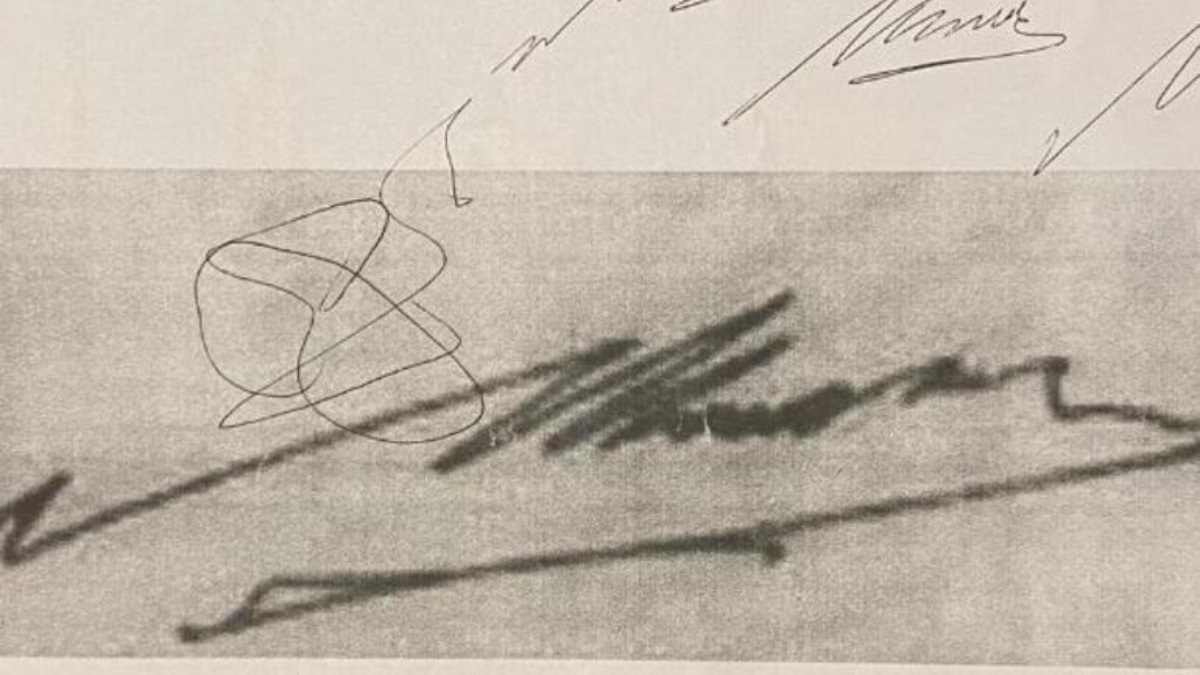
References
- Samoura, Fatma (27 November 2020). "A minute of silence to honour Diego Armando Maradona" (PDF). FIFA. Archived (PDF) from the original on 2 December 2020. Retrieved 2 December 2020.
- ^ "Small is beautiful". FIFA. 8 May 2009. Archived from the original on 13 August 2020. Retrieved 2 December 2020.
- ^ Warrington, Mark WhiteContributions from Declan; Haugstad, Thore; Yokhin, Michael; Murray, Andrew; Stafford-Bloor, Seb; Spurling, Jon; Hess, Alex; Alves, Marcus; published, Alex Reid (5 September 2023). "Ranked! The 100 best football players of all time". fourfourtwo.com. Retrieved 10 November 2023.
- ^ Dart, James; Doyle, Paul; Hill, Jon (12 April 2006). "The greatest rags-to-riches stories ever". The Guardian. Archived from the original on 20 March 2022. Retrieved 10 October 2022.
- ^ Jump up to:
- a b "Don Diego, father of Maradona, dies in Argentine clinic". Reuters. Archived from the original on 25 November 2022. Retrieved 25 November 2022.
- ^ "Hugo Maradona, younger brother of Diego, dies at 52". AP News. 28 December 2021. Archived from the original on 25 November 2022. Retrieved 25 November 2022.
- ^ Paul Doyle (11 July 2012). "Does Diego Maradona have a more famous brother?". The Guardian. Archived from the original on 19 April 2019. Retrieved 25 November 2022.
- ^ "El gallego Maradona". Faro de Vigo. 26 November 2020. Archived from the original on 4 December 2021. Retrieved 29 December 2021.
- ^ Welch, Julie (25 November 2020). "Diego Maradona obituary". The Guardian. Archived from the original on 24 May 2022. Retrieved 26 November 2020.
- ^ "Sinagra: Maradona ha origini italiane? Vi racconto cosa mi diceva Diego. Messi...". AreaNapoli.it (in Italian). Archived from the original on 22 December 2022. Retrieved 22 December 2022.
- ^ "Los desconocidos orígenes croatas de Diego Maradona". www.ambito.com. Archived from the original on 29 December 2022. Retrieved 29 December 2022.
- ^ "El volcánico partido de Maradona en Croacia: visita a la tumba de Petrovic, 0 a 0 arreglado y amenaza de renunciar al Mundial - TyC Sports". www.tycsports.com (in Spanish). 13 December 2022. Archived from the original on 29 December 2022. Retrieved 29 December 2022.
- ^ Jump up to:
- a b c "Diego Maradona - I was there". FIFA. Archived from the original on 15 October 2007. Retrieved 3 December 2020.





















































